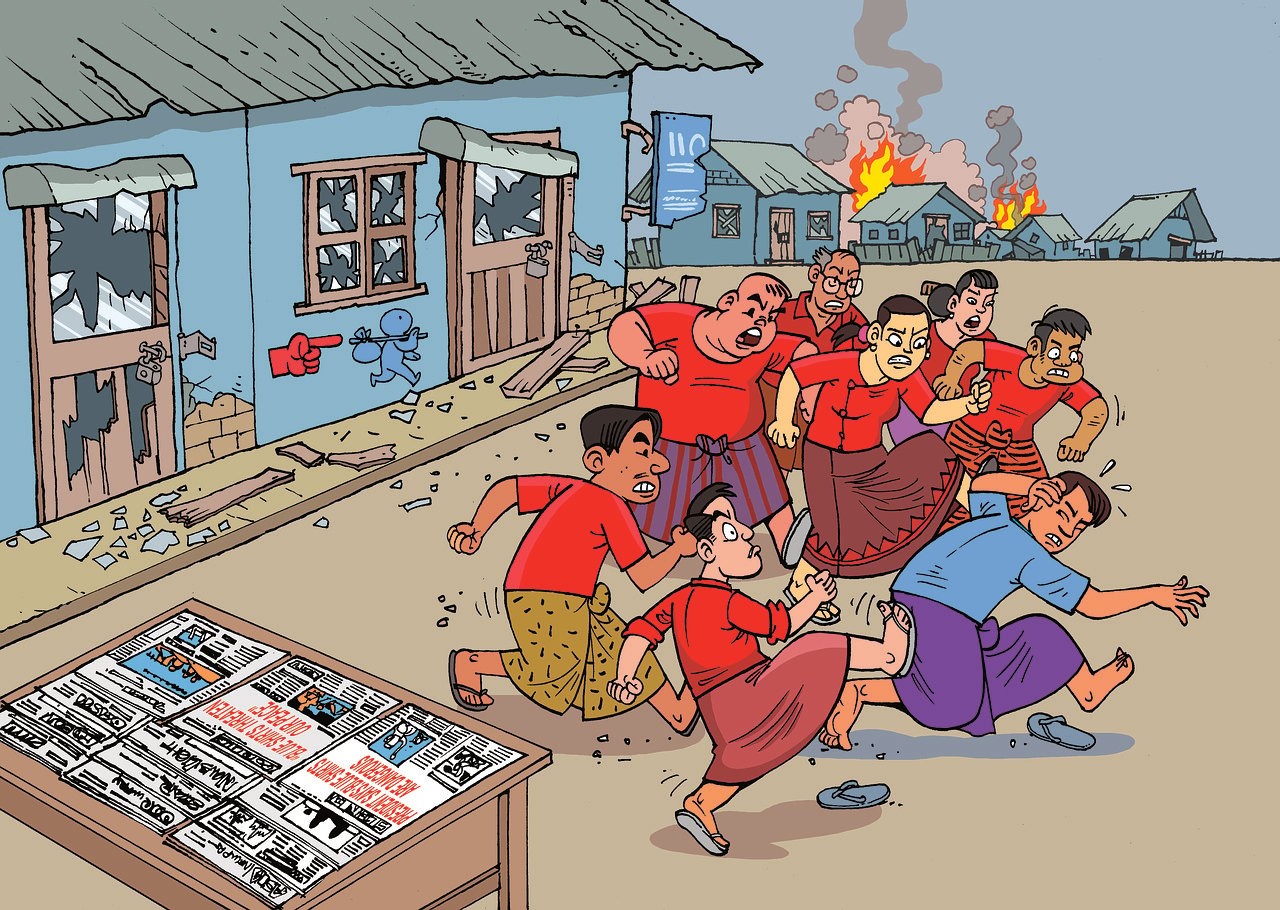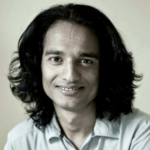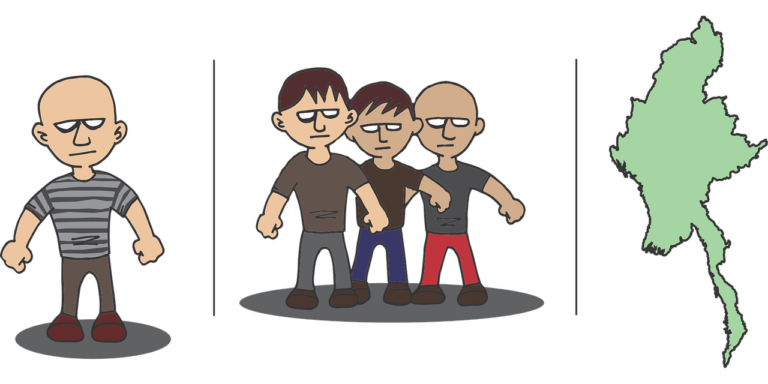
Insurgency again occupies the North Eastern state of Manipur since the first week of May and before the end of July 2023, yet another series of violence is reported, this time from Haryana. Hindu Muslim riots of Nuh in the Mewat region of Haryana soon reached Gurugram in the NCR (National Capital Region). Mahatma Gandhi is now remembered to visit the Ghasera village in Nuh to persuade the Meo ethnic group of Mewat to stay in India when they were leaving for Pakistan during the Partition. He has referred to the Meo as the backbone of India. A decade before that Gandhi referred to an average Hindu as a coward and an average Muslim as a bully!
In Manipur Now it seems the two ethnic groups are not ready to live with each other in the Himalayan province, even as the Supreme Court yesterday appointed a three-member judicial committee to ‘restore the rule of law’ in the state.
The minority ten per cent of Kuki tribals have been occupying fifty per cent of the land area, in addition to dominating bureaucracy in Manipur. Meitei, the majority fifty-six per cent, occupy ten per cent of the land, however, they occupy political power. Today these indigenous people have been trying hard to wipe each other out of Manipur as if they have forgotten all about the homeland.
The bone of contention rests in the verdict of the Manipur High Court on April 20, 2023. Justice M.V. Muralidharan directed the government to consider the Meitei community to be included in the Scheduled Tribe (ST) list. Right after that, this insurgency started, exactly within the next two weeks. Here the long series of violence can be traced back to the nineties that started with the advent of globalisation. In fact, 400 people were killed in the Kuki-Naga clashes of 1993. Again more than 350 tribes were slaughtered in one of the last series of ethnic violence of the 20th century.
Long before the introduction of Christianity among these tribes, the proponents of the Bhakti movement like Chaitanya Mahaprabhu and his disciples reached Manipur to teach them the Hindu way of life. Meiteis are the same tribes scattered across the northeast region. During the colonial regime, Christianity reached there to convert Kuki Zo tribes. Meitei Pangal are yet another indigenous people that came into contact with Islam. Before this introduction of politics of religion, they used to be the Himalayan tribes with their own set of values. Today the Meitei, Kuki and Naga are as white as a Christian or a Hindu or any such sect, and it can be questioned, too. But there is no question about the ethnicity of these two warring fractions. No one has answered what’s wrong with it if the High Court directed to consider Scheduled Tribe status for the Meiteis.
Before the naked parade of the two Kuki women, the video of which became viral and shocked the entire nation, at least twelve Manipuri women were stripped naked in front of Kangla Fort in Imphal Valley on July 15, 2004. Irom Sharmila, often referred to as Iron Lady for her long Satyagraha against AFSPA (Armed Forces Special Powers Act), is another name from the same region. In fact, these protests series were against the government of India. Demands for an independent state are nowhere now, and they have been seeking help from the Indian Army. What the insurgents want today is a separate administrative territory for the Zo tribes.
Ethnic and communal violence always helped the political class to polarise the voters. At least 40,000 Kuki Zo tribes so far migrated from Manipur to certain other parts of the northeast. The state has arranged for the safe return of the Meiteis to Manipur. The working-class migrant Muslims are returning to safe destinations from Gurugram in Haryana. Definitely, it’s going to consolidate the vote banks of political parties in different constituencies. Proponents of the Hindus and the Muslims will be greatly benefited, but at the same time, the vulnerable people like the old and weak, women and children are destined to suffer the most. Ethnicity and Communalism are top terms in public discourse creating a division among the masses. The idea of unity in diversity has nothing to do with the realities of this electoral democracy. Polarisation is the key process that can manage the vote banks effectively. Now it seems to be time-tested. The political theatre is set to repeat at least the century-old tune to win the next elections, however, the top 100 public figures signed the two lines pledge to settle the communal tensions.
Almost six years after the Lucknow Pact and its consociationalism between the Congress Party led by Bal Gangadhar Tilak and the Muslim League represented by the Ali brothers and Jinnah, the appeal for communal harmony was one of the monumental efforts still relevant. In a special session of the Congress Party that was prolonged through September 15 to 19, 1923, when they had gathered in Delhi, Maulana Azad said in his presidential address: “In view of the recent deplorable disturbances we, the undersigned Mussalmans, Hindus and Sikhs, hereby declare, that if any individual or group of individuals, belonging to any community commits any act of violence against or attacks the person, property or honour of women or places of worship of his neighbours or fellow townsmen or helps those who indulge in such misdeeds, is, from the religious point of view, guilty of a great sin and that it is the duty of the coreligionists of such offenders to stand up to resist these miscreants and to protect those who are so attacked. We further appeal to the followers of every religion that they should act, each towards the other, with mutual toleration and regard for the religious ideas of their neighbours and townsmen.”
The approach of this appeal seems to revisit Indian culture. In this context, the sacrifice of Ganesh Shanker Vidyarthi is one of the examples from history. Sadly most other signatories forgot what they signed after returning to their respective places. They tried to focus on how to win elections held before the end of that year. Precisely this is what Netaji Subhash Chandra Bose observed in The Indian Struggle. Ghost of Netaji that once appeared on the Red Fort after World War II in 1945 reflected a similar spirit of that historical appeal during the trial of his Indian National Army (INA) soldiers like Captain Shah Nawaz Khan, Lieutenant Gurbaksh Singh Dhillon and Captain Prem Kumar Sahgal. The study of these few chapters of history can help us to realise the top folly of the last century.
Mahatma Gandhi advised the Congress Party not to contest elections and it was adhered to. C.R. Das and Moti Lal Nehru started the Swaraj Party on January 1, 1923, that contested and won general elections. Netaji used to be one of its prominent leaders before starting the Forward Block.
Today similar kinds of gimmicks are at play to win the electoral battle next year. The displacement of Christian Kukis and Hindu Meiteis in the Himalayas and working-class Muslim migrants of NCR (Gurugram) reflect the politics of divide and rule. Political parties are partners in this sin, vice and crime. They need to make a fresh beginning to address this question. Truth and reconciliation can be the appropriate terms leading the public discourse instead of communalism and ethnic violence. Social Harmony Pact is something equally required in Manipur, Mewat and other parts of India today.
*Author of The Holy Ganga (Rupa 2008) and Honourary Secretary, Srishti Sustainable Development Foundation. Views published are personal.






